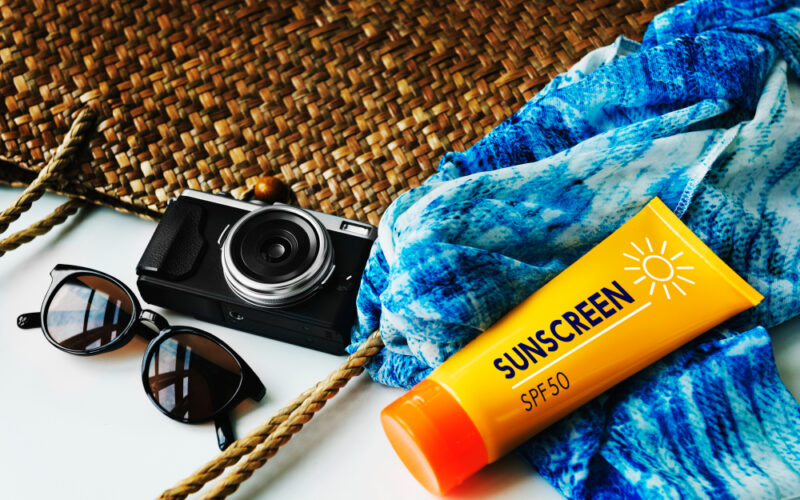Introduction
As winter passes and summer comes through spring, people will be exposed to the sun for a long time. But they must be worried about sunburn. Therefore, sunscreen is a must, and most people apply it. But do you know exactly how this lotion protects our skin? Do I have to wear sunscreen?
How does sunscreen protect people’s skin?
Sunscreens operate by absorbing and blocking ultraviolet rays by way of a blend of chemical and physical particles. To reflect back ultraviolet rays from the skin, physical particles (like titanium dioxide and zinc oxide) are used. Simultaneously, before UV rays penetrate the skin, sunscreen’s complex chemical components respond to radiation, soaking up light rays and emitting energy as heat (Isguven, 2012).
What happens if people don’t wear sunscreen?
1. Sunspots
When the skin is exposed to sunlight for a long time, it leads to skin aging or sunspots, and these usually cause a sensitive, itchy, and burning sensation.
2. Premature Aging
If a person does not apply sunscreen, the connective tissue and collagen of the skin are damaged by ultraviolet rays and lead to elasticity damage. Thus, despite their young age, their skin becomes presbytery, drooping, and wrinkled.
3. Black skin
The human skin produces excess melanin to defend against solar radiation. This causes the color of a person’s skin to be uneven and causes dark spots to appear.
4. Sunburns
Suntan refers to burns on the skin caused by exposure to ultraviolet rays caused by the sun. A person’s skin becomes red and hot and can get blisters. Also, the burnt skin comes off after a few days.
5. Skin cancer
Ultraviolet rays not only cause genetic mutations but also cause DNA damage, which is irreversible. And these can cause skin cancer.
- Inflammation
Exposure to harmful ultraviolet rays can cause inflammation. Inflammation is a natural process that occurs in the body to heal skin damaged by ultraviolet rays. In this process, pain, swelling, and redness can be experienced.
- Dry skin
When sunlight directly touches the skin, natural oils and moisture are lost. This will lead to dehydration, and the skin will form a rough, dry patch.
- Scars
When sunlight touches acne or wounds, scars occur. Exposure to ultraviolet rays in the area that treats inflammation of the skin can cause pigmentation and brown scars (Hari, 2022).
How often should you reapply sunscreen?
The optimal time to reapply sunscreen is 2 to 3 hours apart. Many people don’t reapply sunscreen because they think it lasts longer if you apply it above SPF 50. But that’s a false rumor.
“More SFPs contain more chemicals that can harm people’s health, as well as sunscreen not being effective for longer periods of time,” says Dr. Zell.
Therefore, it is best to use sunscreen in the range of 30 to 50 SPF and apply it again every 2 hours when outside (Hari, 2022).
Conclusion
Long-term sun exposure can cause a variety of ailments, such as sunspots, skin cancer, and aging, so it is critical to protect our skin with sunscreen. Furthermore, the SPF index and the persistence of sunscreens are meaningless. Therefore, use sunscreen with an adequate amount of SPF and reapply it at regular intervals.
References
Isguven, S. (2012). How Does Sunscreen Protect You? [online] Yale Scientific Magazine. Available at: https://www.yalescientific.org/2012/05/how-does-sunscreen-protect-you/ [Accessed 15 April 2023].
Hari, K. (2022). 10 Damaging Effects Of Not Wearing Sunscreen On Skin. [online] Vedix. Available at: https://vedix.com/blogs/articles/effects-of-not-wearing-sunscreen-on-skin#:~:text=10%20Things%20That%20Happen%20When%20You%20Don%27t%20Wear [Accessed 12 April 2023].
